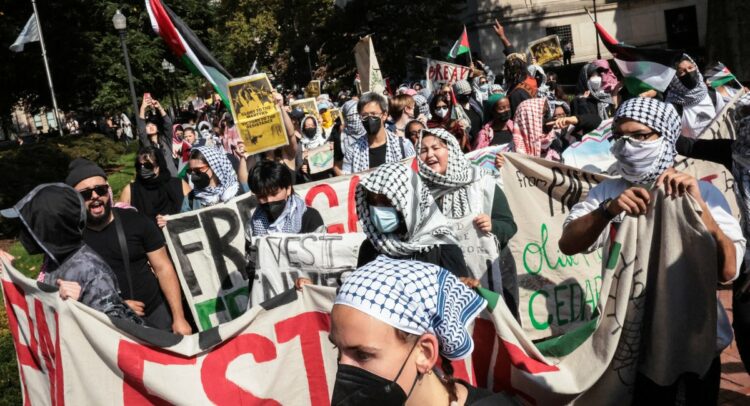Table of Contents
Columbia University Students Participate in Walkout to Commemorate Israel-Hamas Conflict Anniversary
Contextual Background and Preparations
Implications of the Demonstrations
University Administration’s Response
Demonstrations Unfold
Additional Public Responses
Columbia University Students Participate in Walkout to Commemorate Israel-Hamas Conflict Anniversary
On a recent ‌Monday afternoon, hundreds of students at Columbia University participated in a significant walkout as part of broader protests scheduled across various New York City campuses, commemorating the anniversary of the Israel-Hamas war.
Contextual Background and Preparations
Leading up to the walkout, extra security measures were implemented around Columbia’s campus, restricting access solely to enrolled students and faculty. This heightened security was evident as barriers were erected surrounding the area prior to the demonstration, which commenced at 11:45 a.m. On the lawn, where a pro-Palestinian camp resided previously, students had established memorials to honor Israelis who were taken captive or lost their lives during last year’s assaults.
The pro-Palestinian organization, Within Our Lifetime, organized several protests throughout the city, with one event scheduled to start at 3:30 p.m. at Washington Square Park, located in the bustling NYU campus. Pro-Palestinian student organizations from various institutions across the city expressed their intention to partake in these events.
Implications of the Demonstrations
This series of protests represents a significant moment for educational institutions as they navigate new restrictions on expressions of free speech and public demonstrations. The events also occur precisely one year after Hamas’s invasion, which provoked a relentless series of military actions by Israel, leading to an escalated conflict in the broader Middle East region.
These protests marked some of the earliest large gatherings on college campuses since the events of last spring when a pro-Palestinian encampment that originated at Columbia expanded to other universities across the nation. The previous academic year experienced considerable turmoil, with the New York Police Department making numerous arrests during campus protests, subsequently affecting graduation schedules.
University Administration’s Response
In preparation for the anniversary events, local universities have been emphasizing the importance of fostering constructive discussions and have revised their policies regarding student conduct and protest regulations. In a recent communication to students and staff, Interim President Katrina Armstrong of Columbia indicated that the administration had been on high alert for potential unrest in the coming days.
Armstrong elaborated that some groups had collaborated with university officials to orchestrate peaceful protests and commemorative events. However, she also noted that certain assemblies had not received official approval. Furthermore, she revealed concerns over unconnected groups intending to come to Columbia’s campus, raising alarms about possible violent incidents.
Demonstrations Unfold
By noon on the day of the walkout, crowds of pro-Palestinian demonstrators had gathered at Columbia. Many attendees donned keffiyehs and chanted phrases such as, “Free, free Palestine” and “The only solution is intifada, revolution.” In contrast, a group of pro-Israel supporters assembled nearby, brandishing Israeli flags and loudly singing Hebrew songs, which largely overshadowed the chants from the pro-Palestinian crowd.
Onlookers, including students and faculty, engaged with the scene by taking photographs of both demonstrations. A poignant display featured images of individuals still held captive by Hamas, prominently showcased on large cardboard milk cartons.
Additional Public Responses
Elsewhere around the campus, another group of individuals sang traditional Hebrew songs while wearing sweatshirts emblazoned with the message, “Bring Them Home.” Campus police, alongside private security and NYPD officers, established metal barricades to maintain order during the protests.
Among the attendees was 19-year-old Britney Prince, a Brooklyn resident who, although not a Columbia student, felt compelled to join the demonstration. “My world changed exactly a year ago today,” she expressed. “I’m not pleased to be here, but I find comfort in the community around me.”
Some participants in the walkout planned to unite with other marches organized by Within Our Lifetime at over a dozen locations throughout Manhattan, ranging from Wall Street to Columbus Circle. This group aims to “empower the Palestinian people resisting genocide by any necessary measures.” Nerdeen Kiswani, a Palestinian American co-founder of Within Our Lifetime, has publicly advocated for the establishment of a state of Palestine in place of Israel.
In a related announcement, New York City’s education department revealed its plans to introduce a hotline designed for parents, students, and staff in public schools to report incidents involving hate, discrimination, or harassment. Officials stated that the new “anti-hate hotline” will function on weekdays, allowing for anonymous reports.
This article has been updated with further details.
Author : New-York
Publish date : 2024-10-07 23:02:06
Copyright for syndicated content belongs to the linked Source.
